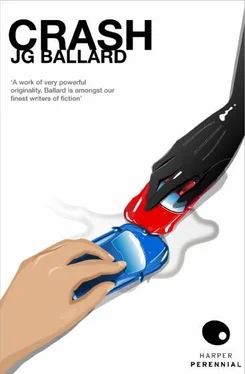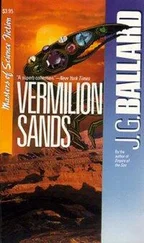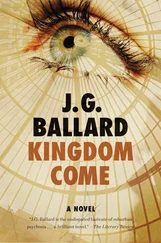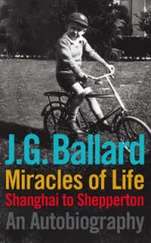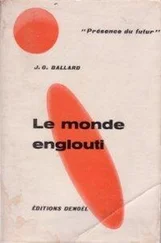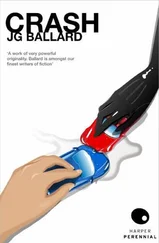Unaware of any pain at that time, I sat with my right hand holding a spoke of the steering wheel. Still wearing her seat belt, the dead man’s wife was coming to her senses. A small group of people—a truck driver, an off-duty soldier in uniform and a woman ice-cream attendant—were pressing their hands at her through the windows, apparently touching parts of her body. She beckoned them away, and freed the harness across her chest, her capable hand fumbling with the chromium release mechanism. For a moment I felt that we were the principal actors at the climax of some grim drama in an unrehearsed theatre of technology, involving these crushed machines, the dead man destroyed in their collision, and the hundreds of drivers waiting beside the stage with their headlamps blazing.
The young woman was helped from her car. Her awkward legs and the angular movements of her head appeared to mimic the distorted streamlining of the two cars. The rectangular bonnet of my car had been wrenched off its seating below the windshield, and the narrow angle between the bonnet and fenders seemed to my exhausted mind to be repeated in everything around me—the expressions and postures of the spectators, the ascending ramp of the flyover, the flight paths of the airliners lifting from the distant runways of the airport. The young woman was carefully steered from her car by an olive-skinned man in the midnight-blue uniform of an Arab airline pilot. A thin stream of urine trickled involuntarily between her legs, running down on to the roadway. The pilot held her shoulders reassuringly. Standing beside their cars, the spectators watched this puddle forming on the oil-stained macadam. In the fading evening light, rainbows began to circle her weak ankles. She turned and stared down at me, a peculiar grimace on her bruised face, a clear confusion of concern and hostility. However, all I could see was the unusual junction of her thighs, opened towards me in this deformed way. It was not the sexuality of the posture that stayed in my mind, but the stylization of the terrible events that had involved us, the extremes of pain and violence ritualized in this gesture of her legs, like the exaggerated pirouette of a mentally defective girl I had once seen performing in a Christmas play at an institution.
I gripped the steering wheel in both hands, trying to keep still. A continuous tremor shook my chest, and almost stopped me from breathing. A policeman’s strong hands held my shoulder. A second policeman placed his flat-peaked cap on the bonnet of the car beside the dead man and began to wrench at the door. The frontal impact had compressed the forward section of the passenger compartment, jamming the doors on to their locks.
An ambulance attendant reached across me and cut the sleeve from my right arm. A young man in a dark suit drew my hand through the window. As the hypodermic needle slid into my arm I wondered if this doctor, who seemed no more than an overlarge child, was old enough to have qualified professionally.
An uneasy euphoria carried me towards the hospital. I vomited across the steering wheel, half-conscious of a series of unpleasant fantasies. Two firemen cut the door from its hinges. Dropping it into the road, they peered down at me like the assistants, of a gored bullfighter. Even their smallest movements seemed to be formalized, hands reaching towards me in a series of coded gestures. If one of them had unbuttoned his coarse serge trousers to reveal his genitalia, and pressed his penis into the bloody crotch of my armpit, even this bizarre act would have been acceptable in terms of the stylization of violence and rescue. I waited for someone to reassure me as I sat there, dressed in another man’s blood while the urine of his young widow formed rainbows around my rescuers’ feet. By this same nightmare logic the firemen racing towards the burning wrecks of crashed airliners might trace obscene or humorous slogans on the scalding concrete with their carbon dioxide sprays, executioners could dress their victims in grotesque costumes. In return, the victims would stylize the entrances to their deaths with ironic gestures, solemnly kissing their executioners’ gun-butts, desecrating imaginary flags. Surgeons would cut themselves carelessly before making their first incisions, wives casually murmur the names of their lovers at the moment of their husbands’ orgasms, the whore mouthing her customer’s penis might without offence bite a small circle of tissue from the upper curvature of his glans. That same painful bite which I once received from a tired prostitute irritated by my hesitant erection reminds me of the stylized gestures of ambulance attendants and filling station personnel, each with their repertory of private movements.
Later, I learned that Vaughan collected the grimaces of casualty nurses in his photographic albums. Their dark skins mediated all the sly sexuality which Vaughan aroused in them. Their patients died in the interval between one rubber-soled step and the next, in the shifting contours of their thighs as they touched each other in the. doors of emergency theatres.
The policemen lifted me from the car, their firm hands steering me on to the stretcher. Already I felt isolated from the reality of this accident. I tried to sit up on the stretcher, and swung my legs from the blanket. The young doctor pushed me back, hitting my chest with the palm of his hand. Surprised by the irritation in his eyes, I lay back passively.
The draped body of the dead man was lifted from the bonnet of my car. Seated like a demented madonna between the doors of the second ambulance, his wife gazed vacantly at the evening traffic. The wound in her right cheek was slowly deforming her face as the bruised tissues gorged themselves on their own blood. Already I was aware that the interlocked radiator grilles of our cars formed the model of an inescapable and perverse union between us. I stared at the contours of her thighs. Across them the grey blanket formed a graceful dune. Somewhere beneath this mound lay the treasure of her pubis. Its precise jut and rake, the untouched sexuality of this intelligent woman, presided over the tragic events of the evening.
The harsh blue lights of police cars revolved within my mind during the next three weeks as I lay in an empty ward of the casualty hospital near London Airport. In this quiet terrain of used-car marts, water reservoirs and remand centres, surrounded by the motorway systems that served London Airport, I began my recovery from the accident. Two wards of twenty-four beds—the maximum number of survivors anticipated—were permanently reserved for the possible victims of an air-crash. One of these was temporarily occupied by car-crash injuries.
Not all the blood which covered me had belonged to the man I killed. The Asian doctors in the emergency theatre found that both my knee-caps had been fractured against the instrument panel. Long spurs of pain reached along the inner surface of my thighs into my groin, as if fine steel catheters were being drawn through the veins of my legs.
Three days after the first surgery on my knees I caught some minor hospital infection. I lay in the empty ward, taking up a bed that belonged by rights to an air-crash victim, and thinking in a disordered way about the wounds and pains he would feel. Around me, the empty beds contained a hundred histories of collision and bereavement, the translation of wounds through the violence of aircraft and automobile crashes. Two nurses moved through the ward, tidying the beds and radio headphones. These amiable young women ministered within a cathedral of-invisible wounds, their burgeoning sexualities presiding over the most terrifying facial and genital injuries.
As they adjusted the harness around my legs, I listened to the aircraft rising from London Airport. The geometry of this complex torture device seemed in some way related to the slopes and contours of these young women’s bodies. Who would be the next tenant of this bed—some middle-aged bank cashier en route to the Balearics, her head full of gin, pubis moistening towards the bored widower seated beside her? After a runway accident at London Airport her body would be marked for years by the bruising of her abdomen against the seat belt stanchion. Each time she slipped away to the lavatory of her provincial restaurant, weakened bladder biting at a worn urethra, during each sex act with her prostatic husband she would think of the few seconds before her crash. Her injuries fixed for ever this imagined infidelity.
Читать дальше
Конец ознакомительного отрывка
Купить книгу
